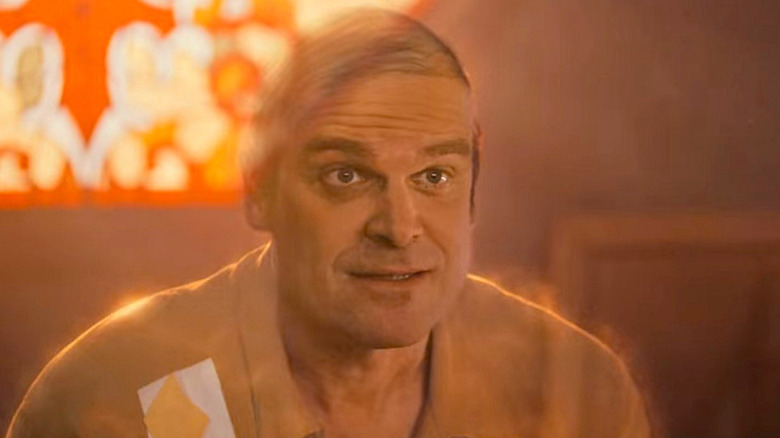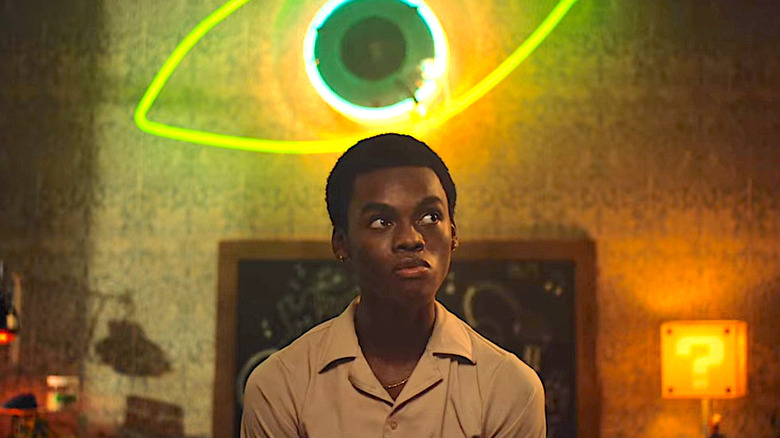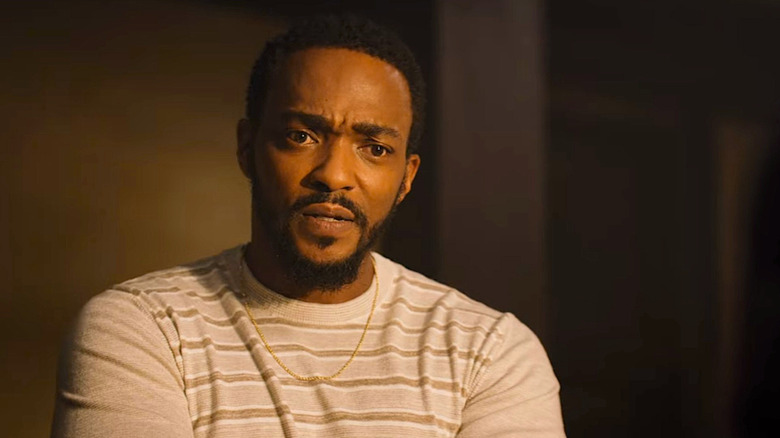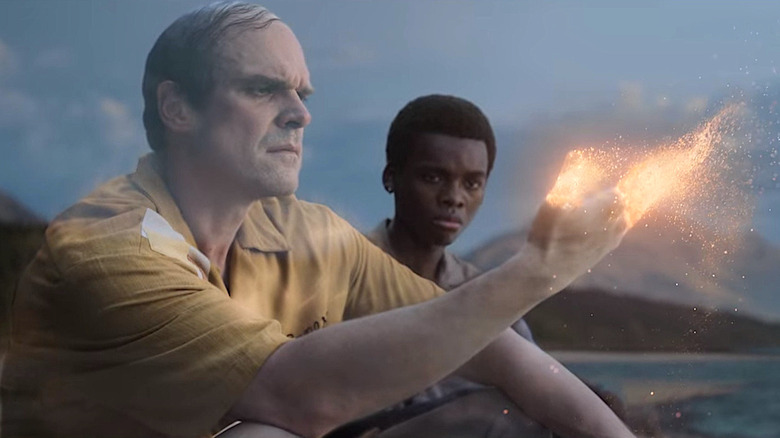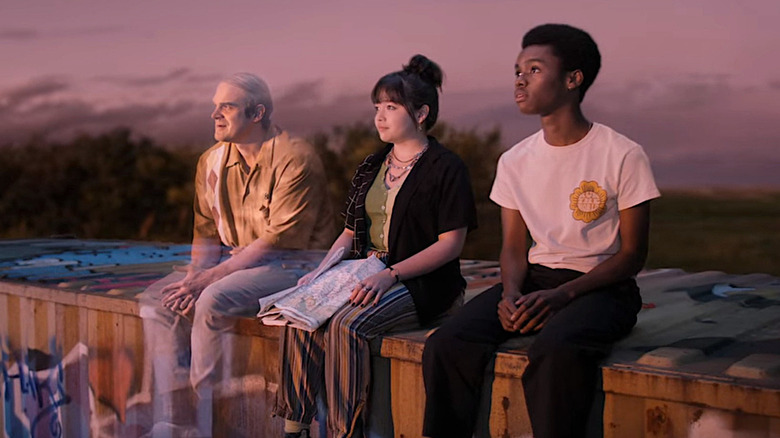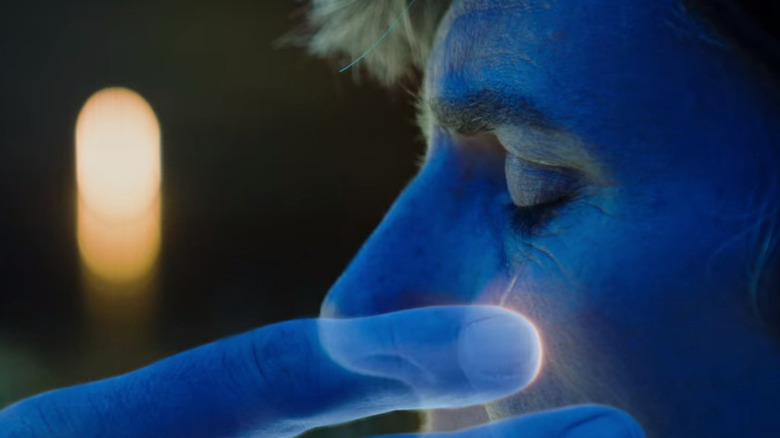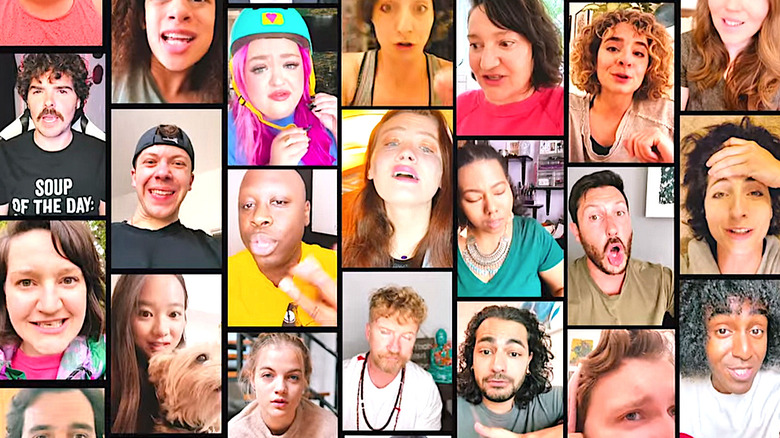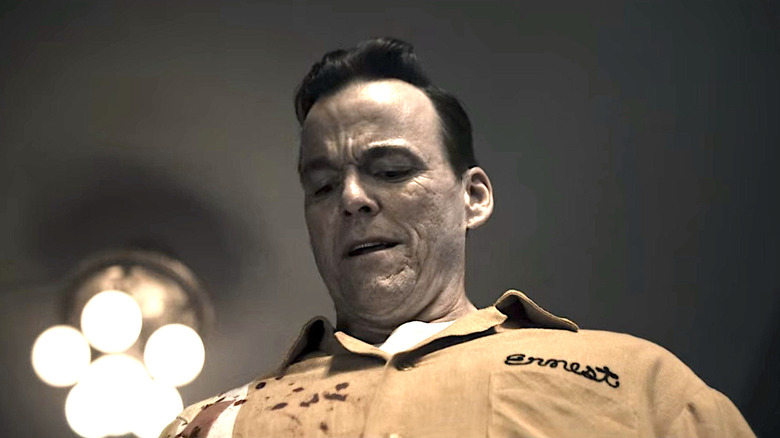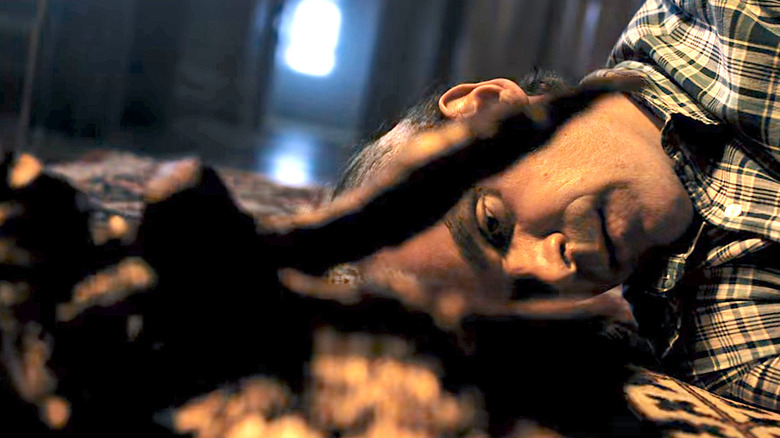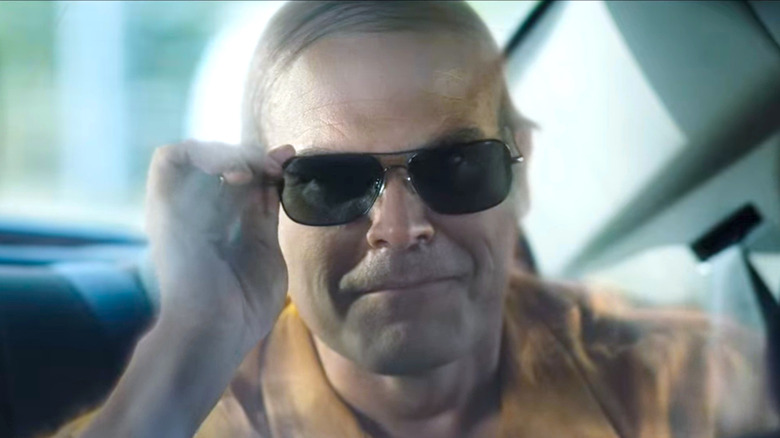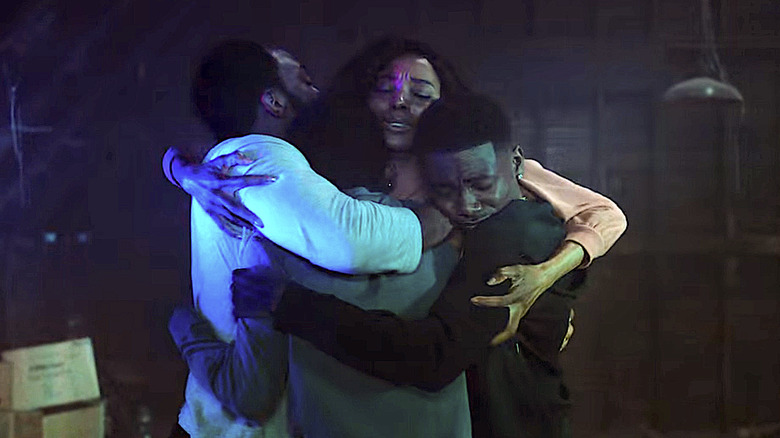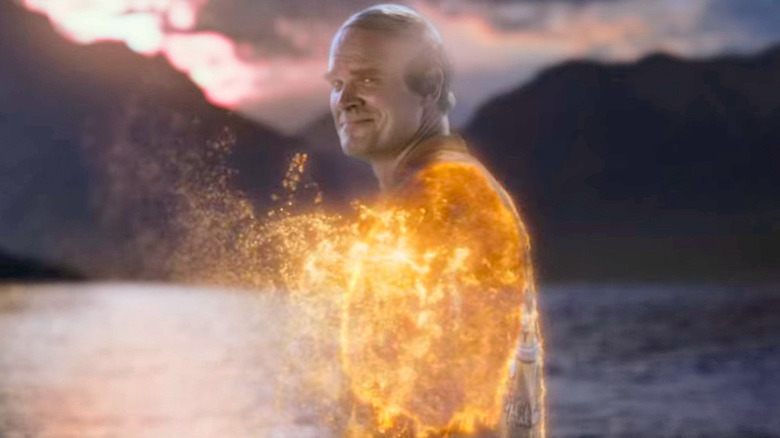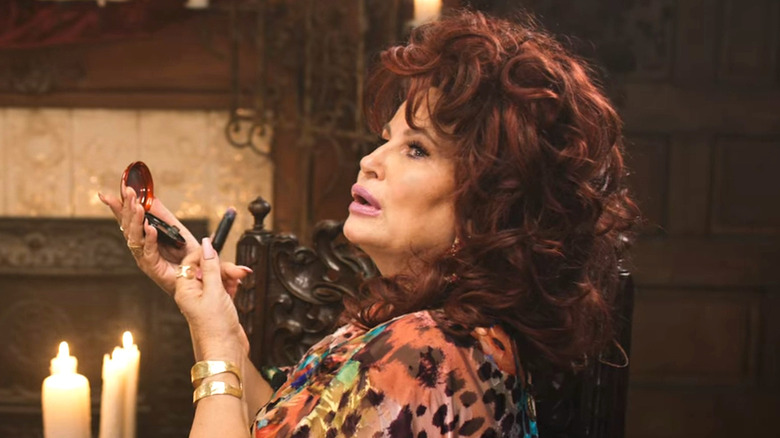The Ending Of Netflix's We Have A Ghost Explained
A heartfelt horror family comedy that scares up serious laughs — and a few misty eyes — "We Have a Ghost" is a unique, heartwarming film. Starring David Harbour, Anthony Mackie and Jahi Di'Allo Winston — and featuring work from names like Tig Notaro, Jennifer Coolidge and Faith Ford — its story (written and directed by Michael Landon's son Christopher) follows a lonely teenager named Kevin (Winston) as he deals with his family's old problems in their new Chicago home. Kevin starts the film wanting to be alone, but his connection with Ernest (Harbour), the mysterious (and silent) ghost that haunts his attic, broadens the young man's horizons. As he works to help Ernest get unstuck from the house, Kevin finds his world expanding, relationships deepening, and CIA ghost-hunters hot on his tail.
In many ways, "Ghost" feels like an Amblin film made for modern audiences. It handles sweet, scary, and silly situations with depth and style —- and at a fairly long runtime for a family film, even if it is a fun world to play in. Based on "Ernest" by Geoff Manaugh and executed by Landon (who made "Freaky," "Happy Death Day 2U," and a solid slice of the "Paranormal Activity" franchise), the filmmaker employs some impressive genre proficiency to make "Ghost" a fun ride through a surprisingly emotional haunted house.
While the film tackles tough subjects, it does so without a trace of cynicism or sugar-coating. It's no easy trick. Creak up the stairs to the thematic attic of this fun, deeply felt piece of spooky cinema and discover the secretive ending of Netflix's "We Have a Ghost."
Parents just don't understand
Kevin is a sweet, frustrated kid. Played with quiet confidence and wounded reservation by "Charm City Kings" star Winston, Kevin starts "We Have a Ghost" suffering from disconnection. He's awkward at conversation, on top of being the new kid in town. He's also grappling with his well-meaning but overbearing dad Frank's get-rich-quick schemes and tendency to move the family around. Kevin and Frank clearly love one another, but they can't connect. Good thing there's a ghost in the attic.
The '70s guitar music that Kevin loves and his dad just doesn't understand is ultimately what lures the mysterious Ernest (David Harbour) into the land of the living. Kevin's music makes Ernest feel safe, just like Ernest's active listening makes Kevin feel heard. Ernest isn't just a good listener because he's silent, either. He pays attention to Kevin, and is attuned in to the kid's emotions and desires in a way Frank just isn't. While Kevin gets a different sort of dad energy from Ernest, he also gets to give it.
Kevin and Ernest need to care and be cared for deeply, and finding an opportunity to do that with each other is a great help. Harbour and Winston are both expressive and vulnerable as scene partners, sometimes communicating oceans of emotion in a single shared look. Kevin empathizes with Ernest's sense of feeling stuck, committing to help Ernest get right with whatever he needs to from his past, so he can safely move on. This is ultimately what Ernest will help Kevin and Frank do — give them an opportunity to connect over feeling "stuck" in old perceptions of one another.
Split happens
Kevin and Ernest's relationship is the soul of "We Have a Ghost," but Kevin and Frank's is its off-beat heart.
Frank is played to humorous, heartbreaking perfection by Mackie; he wants the best for his family and is hopeful their new house will help him deliver on his promises. But listening and moderation aren't Frank's strong suits. Frank's selfishness and rough communication skills drive a wedge between him and his family — and the gap is widest between him and Kevin.
Kevin pours traditional father-son energy into his relationship with Ernest, communicates frustrations with his father's selfishness to Joy, and although he knows he and Frank are disconnected, is resigned to it. Frank isn't played as typical bad dad, however. Frank might not be hearing his family, but just like how a ghost attempts to communicate with flickering lights, something starts to register as Frank watches his son defy him, flee, and ultimately become endangered by the very attention Frank draws to him. Frank's realization that he is the reason the lack of connection exists comes to bear in a powerful monologue Mackie delivers softly near the end of the movie.
Seeing how much Kevin cares for Ernest helps Frank admit his fears to his son, and that he sees Ernest as a way to finally provide for his family. When Frank both listens to and honestly shares himself with Kevin, it gives father and son an exorcism of sorts — and room to grow.
The importance of being Ernest
"Ghost" opens with a big house bathed in moonlight — and a bloodcurdling scream. Out runs a family, fleeing for their lives; its a gorgeous (if typical) horror opener to a not-so-typical family comedy. The cause of the fright is Ernest, the not-so-typical ghost. Ernest doesn't know who he is, or anything about who he was. As a result of his lost identity, all he has known since his 1970s death is fear — feeling it, and causing it. Of course, all of that changes when in moves Kevin.
Kevin is not your "typical" movie teenager. He's tender, observant, and immediately understands that Ernest is trapped in the house, and always will be unless he discovers the truth about himself. The movie doesn't make a meal of its metaphors, but everyone in the film is in danger of being stuck in their own unhappily haunted house, unless they deal with the pain they've tucked away in the attic — or the bodies buried in the backyard.
Kevin helps Ernest discover he isn't Ernest at all, but Randy — a man brutally murdered by his "friend" (the real Ernest) so he and his wife could steal Randy's kid, June. More importantly, Kevin helps Ernest remember his life as a dad. By letting his anger and scare tactics fall away to communication and connection, Ernest discovers, through Kevin, that his daughter has always loved him. Even if he forgot how he important he was, June never did. Ernest — and David Harbour's deeply felt performance — is a powerful reminder that people matter, even when they feel lost and forgotten.
Kindred spirits
Kevin and Ernest aren't the only souls stumbling on their search for connection. Frank Presley longs to connect with his family, even when he doesn't listen to them. Melanie (Erica Ash) wants to connect with Kevin, even when he's on the run. Dr. Leslie Monroe (Notaro) aches to get the old Wizard Clip gang back together, even if she's not so sure how she really feels about ghosts. Even Fake Jesus (Nicholas X. Parsons) tries to connect with the Presleys to get his slice of the viral ghost fame pie.
In fact, Fulton (Niles Fitch) and "The West Bay Medium" (Coolidge) might be the only characters in the film who aren't desperately seeking a better bond with themselves, their friends, or families. Interestingly, they're also the two with the strongest media brands — is writer/director Landon trying to tell his audience something about the key to effective social media engagement?
Kevin's trombone-blaring neighbor, Joy Yoshino (Isabella Russo) finds a kindred spirit in Kevin, and not just because he's a cutie and she has a crush. Kevin helps bust Joy loose of her typical parental "programming," reminding her that there's a life to be lived outside her strict extracurricular schedule. Joy's connection with Kevin and Ernest gives her life. All of the seeking and finding in the movie act as a heartfelt reminder that when someone finds a kindred spirit, they live a little bit better — even if they're already dead.
Dr. Leslie Monroe's change of heart
Notaro's Dr. Leslie Monroe is scared of ghosts. Played with pitch-perfect frazzled scientist energy, Notaro creates a character who has dedicated her life to proving ghosts exist — and that they're dangerous. While viewers don't get much information on the frightening encounter little Leslie experienced as a kid, it's clear that Monroe is haunted by the experience — as well as getting cut cold by the CIA when they closed her "The X-Files"-esque operation, Wizard Clip.
Even though Dr. Monroe is openly disrespected by a former colleague, Steve Coulter's Deputy Director Arnold Schipley, she's still desperate to win back his support after years on the sidelines. She is brutish to the Presleys in her hot pursuit of the ghost — and former glory. Her blind faith in Schipley fades when Dr. Monroe finally comes face to face with Ernest. Instead of being scared by the spirit, however, Ernest shows kindness and care. It surprises Dr. Monroe. When Ernest wipes a tear from her eye, he also wipes a prejudice from her heart.
Shipley plans to do whatever he wants to the "dead" being, and tosses Dr. Monroe a minimal thank you for "assisting" him in Ernest's capture. Later, when Ernest is seemingly tortured by another guard, it's Dr. Monroe who pulls out one of "the ladies" and draws on her colleagues, showing even someone as stuck in the past as Dr. Monroe is capable of growth and change. It's Dr. Monroe's change of ghost-fearing heart that helps save Ernest and, by extension, Kevin and his family's life. That's some personal growth so good, it's spooky.
Ghosts gone viral
"We Have a Ghost" explores some meaty, metaphysical themes with a light touch (and a lot of car chases), but it also asks a compelling question: What would happen if a ghost went viral? The movie feels on target with its depiction, as people don't handle GhostTok too well.
The Presleys draw lots of attention, from Fake Jesus to Doctor Phil. Their house is swarmed with fans. Fulton may or may not date a ghost groupie — it's unclear who he's talking to on that phone call. While the attention wins Fulton some clout (and stresses Kevin and Melanie out), Frank seems to welcome the fan frenzy— until it leads to his family being under siege.
Wizard Clip authorities invading the Presley house and holding the Presleys prisoner evokes both Amblin '80s films like "E.T." and, perhaps, even real-life police brutality. Regardless of any filmmaking intention, much is expressed when a kid like Kevin ends up surrounded by patrol vehicles, or the Presleys are forced to cede control of their own home. Just like Dr. Monroe says, all supernatural beings are real until they're not; viral ghost attention is all fun and games until someone has a gun in your face and demands that you "comply."
Will the real Ernest Scheller please stand up
"These entities, they are dangerous," insists Dr. Leslie Monroe. "They never are who they say they are."
The good doctor is referring to ghosts — but what she says also applies to creeps of living and flesh and blood, like the real Ernest Scheller. "Our Ernest" applies to Ernest the ghost, played by David Harbour. However, his character is only so named because of the bowling shirt he wears bearing the name on the front, and a very cute (and bloodstain free) banana split on the back. Of course, Ernest isn't really his character's real name.
Joy tracks down the real Ernest Scheller (Tom Bower), who sold ghost Ernest's house back in the '70s. Kevin, Ernest, and Joy set out to find out what Ernest Scheller knows, and he tells the kids their Ernest's real name — Randy — as well as a line of baloney about how he abandoned his daughter after his wife's death and probably drank himself into the next realm.
This Ernest is blatantly — and believably — lying about. Ernest Scheller is not only a killer of men and a thief of children — he's a low-down, dirty, lying dog. What's extra heartbreaking is that Ernest (or Randy, if you're a purist) believes this Ernest is telling the truth — he's still at a point in the movie where he hasn't remembered the truth of his past. Kevin calls BS on this Ernest, and loves his Ernest anyway — which is ultimately what helps them both uncover the truth, even if the real Ernest sets out to kill Kevin and anyone else to which he might have told his tall tales.
Where eagles dare
Everyone knows ghosts go bump in the night — but what about eagle statuettes? In the "We Have a Ghost" scene where Kevin learns about Randy "abandoning" June with the "real" Ernest and his wife, an eagle statuette appears to randomly fall from a bookcase in Ernest Scheller's house. This Ernest asks if Randy is present, looking concerned at the thought of his former friend haunting him, even if just for a moment. It's a blink-and-you'll-miss-it moment that gains major significance when our Ernest (Randy) opens his memory floodgates.
Even if our Ernest didn't know why he was compelled to knock the eagle statuette over back at Ernest Scheller's house, the flashback spurred by seeing a Wizard Clip guard's eagle pin reminds our Ernest what that statuette had to do with his death. While Ernest Scheller spins a yarn about a wrecked Randy dropping his kid off and disappearing off the face of the earth, we see the truth.
Randy and June pay a pleasant visit to Ernest Scheller's house (Kevin's house), and Mrs. Scheller takes June upstairs. Then, young Ernest Scheller stone-cold clocks Randy with that eagle statuette, drags his body to the backyard, and buries him in his bloody bowling shirt. A no-muss, no-fuss murder — at least until Kevin Presley shows up and starts asking questions. Suddenly, it is understandable why our Ernest has that intense wave of recognition when Kevin and Joy take him into the backyard for the first time — and why, back at Ernest Scheller's new house, our Ernest's ghost subconscious made that eagle statuette take flight.
New (ghost) rules
Something fun about every ghost movie is how the filmmakers make — or break —- supernatural rules. Ghosts get a lot of new bells and whistles in "We Have a Ghost," but because they're so tied to the movie's themes, none of them seem too wacky to be believed — even if they allow for a lot of off-road ghost action.
Most notably in the film, ghosts can decide to touch people and objects. This is initially played for scares and/or laughs (like when Ernest helps Kevin scare Fulton off in a tussle), but it's played for irritation and fascination later, as Joy can't stop touching Ernest's knee, thrilled that she has the chance. Of course, the corporeality is played to great sentimental effect when Ernest wipes away Dr. Monroe's tear.
This is nothing in comparison to how Ernest's ability to interact with the physical world is played to extreme (and extremely dangerous) hijinks potential when he, Kevin, and Joy take off for a ghost road trip. No one has truly lived until they see a cops-and-robbers-style car chase that gives "The French Connection" a run for its money, albeit with runaway teens and ghosts.
Ernest saves the Presleys
From "The Conjuring" to "The Shining," "The Amityville Horror" to "Beetlejuice," things don't typically go well for families who move into haunted houses. "We Have a Ghost" is different, however, because the Presley family isn't doomed by their ghost — but saved by him.
The Presleys kick the movie off being bad communicators — disconnected and operating at a low simmer of disappointment with one another most of the time. But by the end of the film, they've lived through terrible interrogations, solved a murder mystery, and made a ghost a celebrity who can score free Lyft rides. By the time Ernest bids the Presleys farewell, they have deeply bonded with one another. Even if communication won't always come easy, there is the sense that this family will work to keep their hard-won connections.
Without this newfound understanding and support for one another, the Presleys wouldn't be able to provide a path for Ernest to move on. But they are able to reunite Ernest and his daughter, and he is able to bid both of his families a final, touching farewell before glittering into the great beyond. The Presleys are able to give Ernest the love and care he needs to leave the earthly plane, and Ernest unites the Presleys so they can finally make their haunted house a home.
Friendly ghosts
"We Have a Ghost" is a big, beautiful movie. The sets and costume design are stunning, the set pieces are expansive, and it pulls off a credibly otherworldly ghost. The movie's heart is as strong as its ensemble, who deftly handle tonal shifts on the sweet-to-scary scale. The movie also isn't afraid to linger in dramatic depths a beat longer than you might expect, or comedic character moments that color the world of the film that much brighter.
Much the same can be said for "Stranger Things," the wildly successful TV series powered by touches of nostalgia and floods of heartfelt horror that take more than a little inspiration from Stephen King and Steven Spielberg. Even if "We Have Ghost" didn't star the leading man from that series (David Harbour), the two would still share a lot of storytelling inspirations.
"This really is my love letter to Spielberg, and to "E.T." specifically," writer/director Christopher Landon said to SlashFilm in 2023. "I think that was the most inspiring film for me. Just this unusual connection between a young boy and this ghost."
Spirit, will there be a sequel?
While Ernest and Kevin's story seems all wrapped up and there's no official word on "We Have A Ghost" getting a sequel, Landon certainly seems open to franchises (he's been involved with multiple "Happy Death Day" and "Paranormal Activity" films). Perhaps, it seems, there could even be some scary-good ideas for a "Ghost" spin-off series.
"We Have A Ghost: Unhappy Medium" could bring back Coolidge as fake medium Judy Romano. Ford would also return as Judy's sunny-but-struggling realtor, Barbara Mangold.
Imagine the two ladies going on haunted house hunts in between tapings of "The West Bay Medium." The twist? Ford is a real medium, and ends up solving mysteries for spirit clients while she seeks out the perfect new houses for her living ones.
Notaro could theoretically return as Mangold's unhappy neighbor, who gains new purpose in her life when Romano hires her to help run the show — and chase down ghosts. Perhaps there could even be a cameo from Harbour in the form of blinking lights. Between The Upside Down and Ernest crossing over, he'd find the juice to light up the spin-off ladies' lives. Then again, Jennifer Coolidge is in high demand these days; as nice as it would be to tie her up with such a spin-off series, in some ways it feels like there's barely a ghost of a chance.
